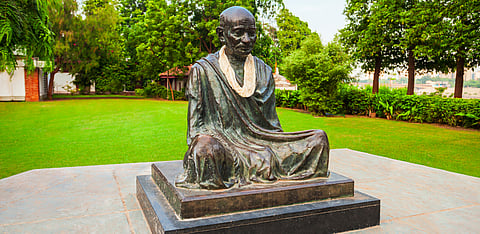

In his appeal against the Gujarat High Court's refusal to quash the government resolution on the project, Mahatma Gandhi's great grandson, Tushar Gandhi has emphasised that the Government's role has been always confined to be that of a funding agency, and never as the initiator or executor of any project associated with Gandhian institutions, monuments and memorials
———
THE Supreme Court on Friday agreed to list an appeal for hearing on April 1 against a Gujarat High Court order refusing to quash a government resolution on the Sabarmati Ashram Redevelopment Project. The appeal was mentioned by senior advocate Indira Jaising on Friday before the Chief Justice of India [CJI] N.V. Ramana for urgent listing since the construction work at the Ashram would be commencing soon. The Gandhi Ashram Memorial at Ahmedabad is managed by the Sabarmati Ashram Preservation Memorial Trust.
Jaising was appearing for Tushar Gandhi, the great-grandson of Mahatma Gandhi. In his appeal, Gandhi has contended that the government's project will change the physical structure of Sabarmati Ashram and corrupt its pristine simplicity and frugality that embodies the ideology of Gandhiji, and make it diametrically opposite to these important Gandhian principles that the Ashram embodies today.
On November 25, 2021, a division bench of the Gujarat High Court closed the public interest litigation filed by Gandhi against the project, taking on record the submission made by the Advocate General [ag] that the existing Gandhi Ashram on Sabarmati Riverfront, which is an area of one acre, would not be disturbed. The AG told the High Court that it would be maintained and all efforts would be made for its improvement, if decided by its Governing Council. The High Court also opined that since the Governing Council and the Executive Council formed under the Governemnt Resolution passed on March 5, 2021, comprise several representatives, including the representative of Sabarmati Ashram Preservation Memorial Trust, the apprehension expressed by Gandhi that the decisions would be taken by the Governing Council or Executive Council unilaterally to the detriment to the Ashram stood allayed.
In his appeal, Gandhi has argued that the High Court limited the understanding of the matter and his concerns to the redevelopment of the Gandhi Ashram Memorial proposed by the Government of Gujarat. He submits that the significance of the land doesn't limit to the one-acre Ashram itself but covers the entire property on the banks of the Sabarmati, which covers more than 100 acres.
"The land serves as a source of inspiration and stands as a monument to Gandhiji's life mission. Not only this, but the entire land also houses the descendants of the families which lived in Sabarmati Ashram at the same time as Gandhiji. The redevelopment project has already uprooted these families, by making them vacate their houses. This is in contravention of the written instructions through which the Sabarmati Ashram and its adjoining land were bequeathed to the Harijan Sevak Sangh", the appeal states.
Besides, Gandhi has argued that it is for the first time that any redevelopment regarding a Gandhi Monument is sought to be undertaken by the government, and the same is contrary to the conscious decision taken by the erstwhile Gandhi Smarak Nidhi, a national organisation which was formed by founders of the nation and eminent contemporaries and associates of Mahatma Gandhi. It became an umbrella organisation managing several Gandhian monuments, including the National Gandhi Museum in Delhi, the Sabarmati Ashram in Ahmedabad and the Mani Bhavan Gandhi Sangrahalaya in Mumbai. Now its state bodies are associated with these monuments and memorials.
The appeal argues that since the establishment of the Gandhi Smarak Nidhi, all decisions concerning the preservation, maintenance and adding of facilities in Ashram precincts have been carried out by the respective trusts that are presently managing the Ashram premises. It adds that as per the founding constitution of the Gandhi Smarak Nidhi, Gandhian institutions and memorials have always been insulated from government or political influence or control. The government's role has been always confined to be that of a funding agency, and never as the initiator or executor of any project associated with these institutions, monuments and memorials.
Gandhi has submitted that with the nature of redevelopment and involvement of the government authorities in the conception and execution of the project, the ashram may lose the Gandhian ethos that have been painstakingly preserved by the Trust. He contends that any redevelopment that is sought to be done at Sabarmati Ashram should only be initiated and spearheaded by the Trusts which presently run the Ashram, and under the aegis of National Gandhi Smarak Nidhi.
On the composition of the governing and executive councils, the appeal argues that the governing council is chaired by the Chief Minister and nine out of its 14 members are government functionaries. The Executive Council, whose duty is to ensure smooth co-ordination between the governing council and the implementation arm, that is, the Ahmedabad Municipal Corporation and Sabarmati Riverfront Development Corporation Limited, is exclusively made up of government functionaries. The appeal, thus, contends that the entire project from its conception to execution is to be handled exclusively by the government, and excludes the associated Gandhian Trusts, Gandhian scholars, and institutions. This constitutes an insidious attempt to take over the memorial by the government, contravening the principle of no government interference.